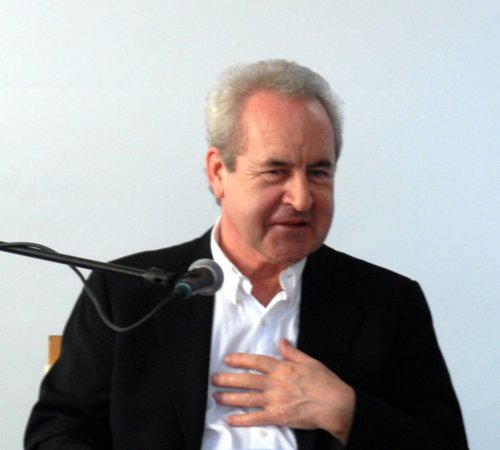John Banville is a Scriptwriter Irlandais born on 8 december 1945 at Wexford (Irlande)

John Banville (né le 8 décembre 1945 à Wexford, Irlande) est un journaliste, romancier et scénariste irlandais qui vit actuellement à Dublin. Il a fait également une incursion dans le roman noir sous le pseudonyme de Benjamin Black.
Il est considéré comme l'un des auteurs vivants les plus importants de langue anglaise. Il est lauréat d'un prix Booker et du Prix Princesse des Asturies.
Il écrit exclusivement en anglais, surtout de la prose et des critiques littéraires. Il rédige en particulier la section littéraire du Irish Times.
Connu pour son style précis, que certains qualifieraient de froid, son ingéniosité et son humour évoquent Nabokov.
Il amorce sa carrière littéraire en 1970 avec la publication d'un recueil de nouvelles intitulé Long Lankin, suivi du roman Nightspawn (1971), dont il n'est guère satisfait. Sa notoriété s'établit avec la parution de Doctor Copernicus qui décroche le James Tait Black Memorial Prize en 1976.
Son roman L'Intouchable (The Untouchable, 1997) s'inspire de la vie d'Anthony Blunt.
Candidat au prix Booker pour Le Livre des aveux (The Book of Evidence) en 1989, il reçoit finalement le prix en 2005 pour son roman La Mer (The Sea).
Éclipse (2000) est un récit relatant l'histoire d'un acteur de théâtre connu et reconnu qui a pourtant raté sa vie.
Depuis 1999, il a signé à l'occasion des scénarios pour le cinéma, notamment celui du film Albert Nobbs (2011), réalisé par Rodrigo García, avec Glenn Close et Janet McTeer.
En 2014, il reçoit le Prix Princesse des Asturies.
Source : Wikidata
John Banville

- Infos
- Photos
- Best films
- Family
- Characters
- Awards
Birth name William John Banville
Nationality Irlande
Birth 8 december 1945 (79 years) at Wexford (Irlande)
Awards Austrian State Prize for European Literature
Nationality Irlande
Birth 8 december 1945 (79 years) at Wexford (Irlande)
Awards Austrian State Prize for European Literature
Il est considéré comme l'un des auteurs vivants les plus importants de langue anglaise. Il est lauréat d'un prix Booker et du Prix Princesse des Asturies.
Il écrit exclusivement en anglais, surtout de la prose et des critiques littéraires. Il rédige en particulier la section littéraire du Irish Times.
Connu pour son style précis, que certains qualifieraient de froid, son ingéniosité et son humour évoquent Nabokov.
Biography
Fils d'un gardien de garage, il caresse l'espoir d'être un jour peintre ou architecte, mais il ne poursuit pas ses études au niveau universitaire. Il travaille un temps pour la compagnie aérienne Aer Lingus, ce qui lui permet de faire des escapades peu coûteuses en Grèce et en Italie. Il s'installe pendant un an aux États-Unis en 1968. À son retour en Irlande, il entre au quotidien The Irish Press, puis au Irish Times où il s'occupe de la section littéraire à partir de 1998. Il collabore d'ailleurs de façon régulière au New York Review of Books dès 1990.Il amorce sa carrière littéraire en 1970 avec la publication d'un recueil de nouvelles intitulé Long Lankin, suivi du roman Nightspawn (1971), dont il n'est guère satisfait. Sa notoriété s'établit avec la parution de Doctor Copernicus qui décroche le James Tait Black Memorial Prize en 1976.
Son roman L'Intouchable (The Untouchable, 1997) s'inspire de la vie d'Anthony Blunt.
Candidat au prix Booker pour Le Livre des aveux (The Book of Evidence) en 1989, il reçoit finalement le prix en 2005 pour son roman La Mer (The Sea).
Éclipse (2000) est un récit relatant l'histoire d'un acteur de théâtre connu et reconnu qui a pourtant raté sa vie.
Depuis 1999, il a signé à l'occasion des scénarios pour le cinéma, notamment celui du film Albert Nobbs (2011), réalisé par Rodrigo García, avec Glenn Close et Janet McTeer.
En 2014, il reçoit le Prix Princesse des Asturies.
Best films
Usually with
Filmography of John Banville (4 films)
Scriptwriter

The Sea (2014)
, 1h26Origin United-kingdom
Genres Drama
Actors Rufus Sewell, Natascha McElhone, Ciarán Hinds, Sinéad Cusack, Bonnie Wright, Charlotte Rampling
Roles Créateur de nouvelle
Rating58%





The story of a man who returns to the sea where he spent his childhood summers in search of peace following the death of his wife.

Albert Nobbs (2011)
, 1h53Directed by Rodrigo García
Origin Irlande
Genres Drama
Themes Films about sexuality, LGBT-related films, Transgender in film, LGBT-related films, LGBT-related film, Lesbian-related films, Cross-dressing in film
Actors Glenn Close, Mia Wasikowska, Aaron Taylor-Johnson, Janet McTeer, Pauline Collins, Jonathan Rhys-Meyers
Rating66%





Albert Nobbs (Glenn Close) is a woman living as a man in order to find work in the harsh environment of 19th-century Ireland. After living as a male for thirty years, Albert, working as a hotel waiter, is known for his extreme dedication to his job, as well as for a very introverted personality. Albert has been secretly saving all his earnings to buy a tobacco shop to gain some measure of freedom and independence.

The Last September (2000)
, 1h43Directed by Deborah Warner
Origin France
Genres Drama, Romance
Actors Maggie Smith, Michael Gambon, Keeley Hawes, Tom Hickey, David Tennant, Lambert Wilson
Rating59%





Preface Although The Last September was first published in 1929, a preface was written for this text decades later to be included in the second American edition of this novel. Concerned that readers unfamiliar with this particular chapter of Anglo-Irish history would not fully comprehend the anxieties of these times, Bowen takes great pains to explain the particulars of both her writing process and the political reasons for the unsettled atmosphere felt throughout the text, palpable even in its most seemingly serene moments. Of all her books, Bowen notes, The Last September is "nearest to my heart, [and it] had a deep, unclouded, spontaneous source. Though not poetic, it brims up with what could be the stuff of poetry, the sensations of youth. It is a work of instinct rather than knowledge—to a degree, a ‘recall’ book, but there had been no such recall before.” While Bowen's own beloved family home, Bowen's Court, remained untouched throughout "The Troubled Times" this preface explores the ramifications for witnesses of “Ambushes, arrests, captures and burning, reprisals and counter-reprisals” as "The British patrolled and hunted; the Irish planned, lay in wait, and struck.” "I was the child of the house from which Danielstown derives" Bowen concludes, “nevertheless, so often in my mind's eye did I see it [Bowen’s Court] burning that the terrible last event in The Last September is more real than anything I have lived through.”

Reflections (1984)
Genres Drama, Romance
Actors Gabriel Byrne, Donal McCann, Fionnula Flanagan, Harriet Walter, Niall Tóibín
Roles Writer
Rating60%





A writer working on a biography of Isaac Newton goes to stay with a declining aristocratic family and becomes entangled with them..
 Connection
Connection




